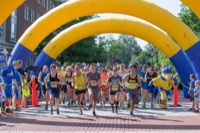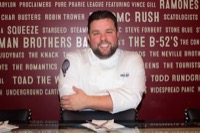Through Oct. 28: Perspectives on research
'Science, Society Sandwiches' speaker series announces October slate
6:46 p.m., Oct. 4, 2013--The University of Delaware’s Interdisciplinary Science and Engineering Laboratory (ISE Lab) will continue its speaker series titled “Science, Society and Sandwiches” with talks throughout October.
The series will be held in Room 110, the first-floor Problem Based Learning (PBL) Studio, from 12:30-2 p.m. on Mondays, beginning Oct. 7.
Events Stories
June 5: Blue Hen 5K
June 6-9: Food and culture series
Sandwiches and beverages will be available for the first 30 who register. To register, send an email to isll-info@udel.edu and provide your name, department and email address. For more information on the series, contact Kimberly Doucette at (302) 831-6400.
The series offers perspectives on contemporary research and issues and discussions of the concepts and issues from multiple points of view.
Each week, speakers from two different departments, and often from two different colleges, present their perspectives on a common problem, issue or concept. Each speaker will be encouraged to give a presentation similar to a TED Talk—that is, each has 18 minutes for a formal presentation followed by ample time for a good conversation through a question and answer period.
The series is seen as a way to continue to promote interdisciplinary work on campus.
The October speakers are:
Oct. 7: T.W. Fraser Russell, the Alan P. Colburn Professor Emeritus of Chemical Engineering, and Joel Best, professor of sociology and criminal justice, will speak on "Uncertainty, Ambiguity, Complexity and Dubious Data." Russell will address what he believes is one of the biggest issues facing students: how to deal with uncertainty, ambiguity and complexity. He has served UD as chair of the Department of Chemical Engineering, acting dean of the College of Engineering, director of the Institute for Energy Conversion and vice provost for research, and has won numerous honors for his teaching and research. Best is the author of Damned Lies and Statistics, considered a classic guide to understanding how numbers can confuse us and how we can learn to think critically about statistics. In a new afterward to the book, he uses examples from recent policy debates to reflect on the challenges to improving statistical literacy.
Oct 14: Karen Rosenberg, chairperson and associate professor of anthropology, and Kathleen R. Slaugh-Sanford, a contract and grants specialist in UD's Research Office, will speak about "Darwin’s Impact on Anthropology and Literature." Rosenberg is a biological anthropologist whose work focuses on human evolution, with special emphasis on childbirth practices, evolution of women, and Neanderthals. Her work has been featured on CNN, in Scientific American, and in a National Geographic cable program. Slaugh-Sanford's doctoral thesis in English was Declaring Genius: Literary and scientific claims of artistic genius in late-Victorian Britain, which explored the ways in which authors contended with scientific ideas about their creative genius.
Oct. 21: Ismat Shah, professor of material science and engineering and of physics and astronomy, and Tom Powers, professor of philosophy and of public policy and administration, will speak on "The Engineering and Ethics of the Very Small." They will describe their grant-funded collaboration on the ethics of nanoscience, which has produced an undergraduate course, two international conferences and some co-authored publications and has enabled the establishment of a comprehensive program to prepare undergraduate students for nanotechnology. Shah focuses his research on low dimensional materials and is also a senior policy fellow in UD's Center for Energy and Environmental Policy. Powers is a specialist in scientific ethics, with specific interests in the ethics of emerging technologies, the environment, nanotechnology and research, and directs UD's Center for Science, Ethics and Public Policy.
Oct. 28: Judith Hough-Goldstein, professor of entomology and wildlife ecology, and Meg McGuire, assistant professor of English, will speak on "Green Rhetoric and Invasive Species." Hough-Goldstein, an expert on invasive plants, focuses her research on restoration ecology, biological control, plant/insect interactions and insect pest management. McGuire, who teaches courses in technical and professional communication including environmental communication, will discuss "Trail View," which gives users the opportunity to do virtual hikes through National Parks, and examine how it is shifting audiences’ relationship to nature. Her research interests include the significance of public discourse in social media.








